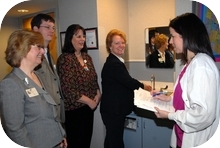 An estimated 85 percent of hospital-acquired infections are due to organisms carried on the hands of personnel. As a result, Winchester Hospital has launched a hospital-wide hand hygiene competency for all employees in an effort to save patients from avoidable harm.
An estimated 85 percent of hospital-acquired infections are due to organisms carried on the hands of personnel. As a result, Winchester Hospital has launched a hospital-wide hand hygiene competency for all employees in an effort to save patients from avoidable harm.
The competency includes reciting three opportunities for hand hygiene, communicating three infection prevention strategies (staying home if you are ill, coughing or sneezing into your elbow or sleeve, and hand hygiene), and demonstrating proper hand hygiene technique with either soap and water or alcohol-based hand gel.
To kick off the competency assessment, the hospital's senior management team had their hand hygiene practices reviewed by Pam Linzer, infection prevention specialist at Winchester Hospital. Every employee's hand hygiene competency is being assessed in their department and evaluated by a champion of Winchester Hospital's Environment of Safety Committee, a Nursing Quality Council representative, or an infection prevention champion selected within their department.
Last year, Winchester Hospital's Medical/Infectious Diseases Unit Performance Improvement Team set a goal to reduce all hospital-acquired infections due to multidrug resistant organisms (MRSA, CDIFF, VRE, or ESBL) by 50 percent (eight or more cases). Whereas 21 percent of unit employees were observed complying with hand hygiene in December 2008, the unit reached 100 percent compliance by March 2009. The monthly statistics have not fallen below 85 percent since that time.
The team achieved this goal through employee feedback, which suggested adding more Purell dispensers, making the dispensers more visible, adding wipe holders to the unit, and posting flyers about the importance of hand hygiene.
The second phase of the process, which began in April 2009, focused on the isolate practices and compliance. That month, employees of the Medical/Infectious Diseases Unit were observed complying with the use of gowns and gloves when entering a marked isolation room 50 percent of the time. Four months later, compliance had soared to 80 percent. The program is being rolled out to other units in the hospital.
Thanks to the great efforts of this team, Winchester Hospital has become a safer place for our patients and employees.
Healthcare Acquired Infections
Healthcare acquired infections (HAIs), also known as nosocomial infections, are infections that patients get while receiving treatment for medical or surgical conditions. HAIs occur in all settings of care, including hospitals, surgical centers, ambulatory clinics, and long-term care facilities such as nursing homes and rehabilitation facilities.

